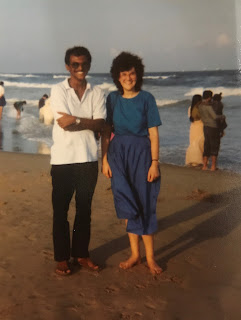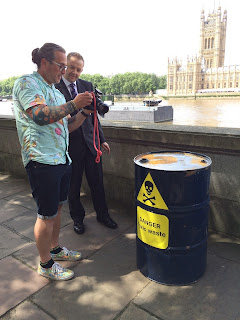There's a big wide world out there: 1 - India
For some time now I've been wanting to write a blog about my experiences of 'the big wide world' - and more importantly the people I have met - and the more I think about it, the more things I want to write about. So I've decided it's going to be (at least) a two-parter.
Here we go with part one - which is about India.
Sorting out some things at my mother's house recently, I came across a bundle of letters which I had sent home on various occasions. It included some letters from my first trip to India in December 1988.
Here's where we begin:
'We had a reasonable flight over. Arrived in Bombay about 5pm (by the time we left the airport) and got a taxi to the address we'd been given. The taxi ride was quite an experience. It was just about rush hour and there was so much to take in. Just the sheer numbers of people all out on the streets, some obviously living on the streets, some just going home etc. A young woman with a baby came up to us to beg while we were stopped in a traffic jam. It's very difficult to be firm and not give anything and yet be compassionate.'
Perhaps I should go back a bit further. I grew up on tales of India. My mother was born in India, where her father was an army doctor, and although she came 'home' to England before she was five, she still regailed us with stories of snake-charmers, cobras and scorpions. Her mother (my grandmother) was born somewhere between what is now India and Pakistan, and spent a good part of her childhood in Nepal, where her father (my great-grandfather) was the British Resident. We have my great-grandmother's diary from those years which tells of elephant rides, tiger hunts, royal durbars and a surprisingly relaxed approach to bringing up her three small daughters. And (given the era) an equally surprising compassion and understanding towards Indian people.
There's no getting away from the fact that my family were part of the colonial project, and however understanding they were towards Indian people, that's not something I feel particularly proud about.
But from quite a young age I really wanted to go to India. And I wanted to do it my own way - not going as a tourist to visit the sites, but with an opportunity to meet people.
That first visit came about through the Taize community - a Christian community in France which welcomes young people to explore their faith. They were holding an international meeting in Madras (now Chennai) and I knew this was the opportunity I'd been looking for.
I was doing my PhD at the time, I was twenty-three, and I'd never been outside Europe. I was bowled over by India. It was so different from anything I had experienced before. The colours, the sounds, the smells, the tastes... and yet I found a common humanity with the people I met. People are people, wherever they are in the world.
I travelled with Linda who I had met at Taize, and we were looked after by different families and communities, organised by the Taize volunteers. In Chennai, we stayed with Anita and Kenny, sister and brother, who were about our age. Thirty-three years later, we are all still friends.
 | |
| With Kenny on the beach. |
Anita and Kenny and their family are Indian Christians - now an increasingly difficult thing to be given India's Hindu nationalist government. We stayed with them for a week or so that first time, and I remember shared meals, discussions and debates, and lots of laughter. Visiting the sites of Chennai, and walking along the beach at dusk. Kenny telling us to wait around the corner while he called an autorickshaw so that the driver wouldn't try and charge extra because we were European.
At the time, Linda was doing schools work for Save the Children, and she had persuaded them to allow us to visit some of their projects in the area. We drove down the coast from Chennai, and for the first time I got a glimpse of rural poverty in India - children with signs of malnutrition in the villages along the coast. And also felt for the first time something I have experienced so often since - that feeling that as a foreigner you can never totally understand what is going on in a community, that you are an intruder and need to question your right to turn up with so-called solutions to other people's poverty.I remember discussing all this with Linda on a train going across India somewhere, and I know that when I got back I joined the World Development Movement (now Global Justice Now) and started to get involved in campaigning in the UK. It felt like the right thing to do - to try and do something about the injustice my country was causing - rather than telling people in another country how they should live their lives.
But I had got the India bug, and started thinking about how I could get back. Once I'd finished my PhD in January 1992, I went on a (potential) six month placement with a church organisation to Sunanda Maitri Sagar, a community run by two Indian Roman Catholic nuns - Sister Celestine and Sister Jude - in rural Karnataka, south India.
 |
| Sr Celestine, me, Sr Jude |
They were months that changed my life. They were not easy - I've just re-read my letters to my parents and been reminded how hard that time was. Not having a specific role, and never quite knowing what was going on, being out of my depth socially and culturally. But beginning to understand the reality of rural poverty, and most importantly, beginning to get to know people who were living in extreme poverty as people. Not faceless objects of pity, but people with hopes and dreams, likes and dislikes, skills and weaknesses.
I spent some time teaching English to some of the local children. One of my pupils was a lad called Shiva, who came from a very poor family. I was told his mother was a 'devadasi' - a so-called temple prostitute - and he was clearly seen as different by the other children. He had had hardly any schooling, and he didn't much like school work. But he had a good ear for accents - he used to accurately mimic my middle class accent when I said 'Good', and he had a great sense of humour.
 |
| 'The boys' - Shiva is on the left |
He must be in his 40s now, I don't know what path life took for him. I don't imagine that the few months I spent with him helped him much. I don't know if he remembers the strange English woman who tried to teach him how to sound the letters out...
But I learnt from him (and others) that poverty is tough, and it's normal. It's how most people around the world live.
Around four months into my stay, my father died very suddenly from a heart attack. It took a few days for my mother to get the news out to me. The thing I remember now most clearly was the love and support from everyone around me. Shiva and some of the other boys came and sat with me. They knew about death, they had probably all experienced it. When I got back to England, I found (some) people tongue-tied and unable to deal with my grief - but in India, everyone got it.
Nearly ten years later I went back to India with my husband. So much had changed, and although we were able to visit Sunanda, Shiva and the other boys had all grown up and left the village. The kind of interfaith work which Sunanda had pioneered had stopped, and there was a sense that different faith groups had retreated to their bases.
Now I have dear work colleagues from India, and I love hearing the sounds of crows and autorickshaw horns in the background on Zoom calls - but I haven't managed to go to India for twenty years. Given cancer and Covid, I think it's probably not going to happen and that makes me very sad.
Part two of this blog (when I get round to writing it) will be about other countries I have visited and things I have learned. But India above all changed me. I met some amazing people who challenged my thinking. I realised that my world, my European 'rich world' life, is the exception rather than the rule. That for most people, life is hard, hard, hard. Poverty isn't some kind of romantic ideal, it's real and it's tough.
There have inevitably been times in the last year and a bit when I have asked myself, 'Why me?' and thought 'It's not fair.' The people I met in India (and elsewhere) taught me that life absolutely isn't fair, and there is no point in feeling self pity. You have to get on with what you have, make the best of it and do what you can to make the world a better place. I do have cancer - but I also live in a country with one of the best health systems in the world (and which is free!), I have support from family and friends and financial security.
This has been a surprisingly hard blog to write. Mostly that's because I've been feeling quite down for the last week or so. New Year wasn't easy, and tomorrow I'm starting another cycle of chemo. This lot has been physically easier than the chemo I had last year but still hard - perhaps harder than I've allowed myself to admit. And thinking about India has brought back mixed emotions and memories that I haven't revisited in a while. But it's also good to be reminded of the good times and the people I met.
This blog is dedicated to Kenny and his family and to Linda, with thanks for putting up with me for three weeks in 1988/9!



Comments
Post a Comment